| Listing 1 - 10 of 22 | << page >> |
Sort by
|
Book
ISBN: 9781107074484 9781139696883 9781107426405 9781316073827 1316073823 1139696882 1107074487 1107426405 1316083284 1316054918 1316076199 1316080927 1316071464 1316078566 1322177112 1316057283 Year: 2014 Volume: *92 Publisher: Cambridge : Cambridge University Press,
Abstract | Keywords | Export | Availability | Bookmark
 Loading...
Loading...Choose an application
- Reference Manager
- EndNote
- RefWorks (Direct export to RefWorks)
Fundamentally revising our understanding of the nature and intellectual contours of early English Protestantism, Karl Gunther argues that sixteenth-century English evangelicals were calling for reforms and envisioning godly life in ways that were far more radical than have hitherto been appreciated. Typically such ideas have been seen as later historical developments, associated especially with radical puritanism, but Gunther's work draws attention to their development in the earliest decades of the English Reformation. Along the way, the book offers new interpretations of central episodes in this period of England's history, such as the 'Troubles at Frankfurt' under Mary and the Elizabethan vestments controversy. By shedding new light on early English Protestantism, the book ultimately casts the later development of puritanism in a new light, enabling us to re-situate it in a history of radical Protestant thought that reaches back to the beginnings of the English Reformation itself.
284.1 <420> "15" --- Lutheraanse hervorming. Reformatie van Luther--Engeland--?"15" --- 284.1 <420> "15" Lutheraanse hervorming. Reformatie van Luther--Engeland--?"15" --- Reformation --- Protestantism --- Christianity --- Church history --- Protestant churches --- English Reformation --- History --- England
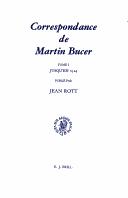
ISBN: 9789004306790 900430679X 9004058052 9004086366 9004103694 9789004116207 9789004138612 9789004154940 9789004171329 9789004203648 9789004265264 9004116206 9004138617 9004154949 9789004103696 9789004265271 9004309888 9004474498 9789004309883 9789004474673 9789004475816 9004474676 9004171320 9789004058057 9004203648 9004265260 900430987X 9789004309876 Year: 1995 Volume: 56 3 Publisher: Leiden; Boston : BRILL
Abstract | Keywords | Export | Availability | Bookmark
 Loading...
Loading...Choose an application
- Reference Manager
- EndNote
- RefWorks (Direct export to RefWorks)
The third volume of Bucer's Correspondance covers the years from 1527 to 1529. In this period the reformer played an increasing part in Strasbourg, while his renown started growing abroad. In Strasbourg he was put in charge of the St. Thomas parish, located closer to the city center. Along with his colleagues he appealed relentlessly to the City Council for a stricter moral discipline, for struggle against anabaptism and celebration of the mass, which was suspended on February 20, 1529. Moreover he engaged in great activity in publishing five important biblical commentaries. Outside Strasbourg he intensified his evangelical propaganda in countries speaking romanic languages. His active involvement in the Berne disputation in January 1528 helped him make contact with the European Reformation. In the disastrous sacramentary strife he continued taking part in advocating concord between the protestant theologians. That is why he joined Philip von Hessen in setting up the Marburg colloquium. Faced with whose partial failure, he did his best to encourage Zwingli's project of a defensive alliance among evangelical cities in Switzerland and in the South-West of Germany, called the "Burgrecht".
2 BUCER, MARTIN --- 2 BUCER, MARTIN Godsdienst. Theologie--BUCER, MARTIN --- Godsdienst. Theologie--BUCER, MARTIN --- Bucer, Martin --- Oeuvres --- Édition critique --- Reformation --- Réformation --- Correspondence. --- Correspondance --- Bucer, Martin, --- Correspondence --- Butzer, Martin, --- Reformers --- 284.1 <093> --- -Protestant Reformation --- Church history --- Counter-Reformation --- Protestantism --- 284.1 <093> Lutheraanse hervorming. Reformatie van Luther--Historische bronnen --- Lutheraanse hervorming. Reformatie van Luther--Historische bronnen --- History --- -284.1 <093> Lutheraanse hervorming. Reformatie van Luther--Historische bronnen --- Protestant Reformation --- Bucerus, Martinus --- Reformation - Correspondence --- Bucer, Martin, - 1491-1551
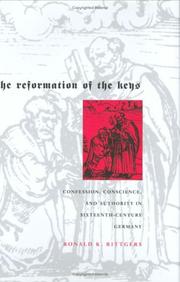
ISBN: 0674042794 9780674042797 9780674011762 0674011767 0674011767 Year: 2004 Publisher: Cambridge, Mass. Harvard University Press
Abstract | Keywords | Export | Availability | Bookmark
 Loading...
Loading...Choose an application
- Reference Manager
- EndNote
- RefWorks (Direct export to RefWorks)
The Catholic Church's claims to spiritual and temporal authority rest on Jesus' promise in the gospels to give Peter the keys to the kingdom of heaven. In the sixteenth century, leaders of the German Reformation sought a fundamental transformation of this "power of the keys" as part of their efforts to rid Church and society of alleged clerical abuses. Central to this transformation was a thoroughgoing reform of private confession. Unlike other Protestants, Lutherans chose not to abolish private confession but to change it to suit their theological convictions and social needs. In a fascinating examination of this new religious practice, Ronald Rittgers traces the development of Lutheran private confession, demonstrating how it consistently balanced competing concerns for spiritual freedom and moral discipline. The reformation of private confession was part of a much larger reformation of the power of the keys that had profound implications for the use of religious authority in sixteenth-century Germany. As the first full-length study of the role of Lutheran private confession in the German Reformation, this book is a welcome contribution to early modern European and religious history. Table of Contents: List of Figures Acknowledgments Introduction 1. Allegiance to the Regnum 2. Between Hope and Fear 3. The Assault on the Keys 4. Tentative Beginnings 5. An Evangelical Dilemma 6. The New Rite 7. Resisting the Old Jurisdiction 8. Confession Established 9. Propaganda and Practice Conclusion Notes Bibliography Index Figures Map of the Holy Roman Empire Late medieval Nuernberg The 1539 Schembartlauf hell-float The storming of the hell-float Woodcut from Andreas Osiander's children's sermon on the keys In an exceptionally fair-minded and scrupulous book, Ronald Rittgers charts a route through theological and social complexities with great clarity and subtlety. Lutherans experienced strong and conflicting emotions about confession, and Nuremberg makes a fine case study of their divergent reactions. This is an original and important addition to scholarship.--Andrew Pettegree, University of St. AndrewsA finely detailed survey of the disputes and controversies surrounding the introduction of an evangelical form of confession in sixteenth-century Nuremberg. There is, to my knowledge, no comparable treatment of the subject. Rittgers's study is deeply researched. His writing is fluent, the argument easy to follow. Useful for Reformation scholars, this book also holds much for the general reader with a serious interest in the history of the Reformation.--Gerald Strauss, Emeritus, Indiana University
Reformation --- Power of the keys --- Binding and loosing --- Keys, Power of the --- Absolution --- Penance --- History of doctrines --- 284.1 <43> "15" --- 284.1 <43> "15" Lutheraanse hervorming. Reformatie van Luther--Duitsland voor 1945 en na 1989--?"15" --- Lutheraanse hervorming. Reformatie van Luther--Duitsland voor 1945 en na 1989--?"15" --- Germany
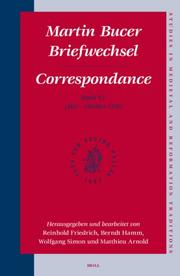

ISSN: 15734188 ISBN: 1283856328 900421058X 9789004210585 9004203648 9789004203648 9789004154940 9004154949 9789004309876 9789004058057 9789004103696 9789004306790 9789004265264 900430679X 9004103694 9789004116207 9789004171329 9004265260 9004171320 9004116206 9004058052 900430987X 9789004265271 9004086366 9789004138612 9004265279 9004138617 Year: 1979 Volume: v. 153 Publisher: Leiden : Brill,
Abstract | Keywords | Export | Availability | Bookmark
 Loading...
Loading...Choose an application
- Reference Manager
- EndNote
- RefWorks (Direct export to RefWorks)
Nachdem Bucer sich im Winter 1531/32 in Straßburg mit den dort zahlreich versammelten Dissenters auseinandergesetzt hat, rückt ab dem Frühjahr 1532 wieder die Reichspolitik ins Zentrum seiner Aufmerksamkeit, als in Schweinfurt in Bucers Gegenwart die Verhandlungen über einen befristeten Waffenstillstand zwischen Kaiser und Protestanten beginnen. Erst Bucers theologische Gutachten und Argumentationshilfen eröffnen den Oberdeutschen dort die Möglichkeit, die Lehrformulierungen der Confessio Augustana und ihrer Apologie mitzutragen und so gegen das Kalkül des Kaisers die politische Isolation zu vermeiden. Während die lutherische Seite dies als Wechsel auf ihre Seite deutet, fühlen sich die Zwinglianer im Stich gelassen, zumal Bucer seine scharfe Kritik an deren Akzeptanz des Zweiten Kappeler Landfriedens bekräftigt. So muss Bucer sich für die Unterschrift von Schweinfurt vielfach rechtfertigen. Ausführlich und theologisch substantiell tut er dies in seinen Schreiben an Bonifatius Wolfhart, Leo Jud und Heinrich Bullinger.
Reformation --- Protestant Reformation --- Church history --- Counter-Reformation --- Protestantism --- History --- Bucer, Martin, --- Bucerus, Martinus --- 284.1 <093> --- 284.1 <093> Lutheraanse hervorming. Reformatie van Luther--Historische bronnen --- Lutheraanse hervorming. Reformatie van Luther--Historische bronnen --- Bucer, Martin, - 1491-1551 --- -Correspondence --- Bucer, Martin --- Oeuvres --- Édition critique --- Correspondence. --- Réformation --- Correspondance --- Correspondence --- Butzer, Martin,
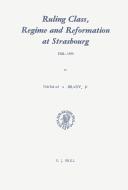
ISBN: 9004052852 9004474951 0585324492 9780585324494 9789004052857 Year: 1978 Volume: 22
Abstract | Keywords | Export | Availability | Bookmark
 Loading...
Loading...Choose an application
- Reference Manager
- EndNote
- RefWorks (Direct export to RefWorks)
Christian church history
---
History of France
---
anno 1500-1599
---
Strasbourg
---
Elite (Social sciences)
---
History
---
Strasbourg (France)
---
Social conditions
---
Politics and government
---
284.1 <43>
---
284.1 <44 STRASBOURG>
---
094.1 <44 STRASBOURG>
---
-Elites (Social sciences)
---
Leadership
---
Power (Social sciences)
---
Social classes
---
Social groups
---
094.1 <44 STRASBOURG> Oude drukken: bibliografie--
Book
ISSN: 15734188 ISBN: 9789004232051 9789004232068 9004232060 9781283602198 1283602199 9004232052 9786613914644 6613914649 Year: 2012 Volume: 162 Publisher: Leiden ; Boston : Brill,
Abstract | Keywords | Export | Availability | Bookmark
 Loading...
Loading...Choose an application
- Reference Manager
- EndNote
- RefWorks (Direct export to RefWorks)
This project examines the important implications of printed vernacular appeals to a nascent public by the reformer William Tyndale, by religious conservatives such as Thomas More, and by Henry VIII’s regime in the volatile early years of the English Reformation. The book explores the nature of this public (materially and as a discursive concept) and the various ways in which Tyndale provoked and justified public discussion of the central religious issues of his day. Tyndale’s writings raised important issues of authority and legitimacy and challenged many of the traditional notions of hierarchy at the heart of early modern European society. This study analyzes how this challenge manifested itself in Tyndale’s ecclesiology and his political theology.
Book history
---
History of the United Kingdom and Ireland
---
Tyndale, William
---
anno 1500-1599
---
Reformation
---
Tyndale, William,
---
094.1 <41 LONDON>
---
284.1 <420> "15"
---
English Reformation
---
Oude drukken: bibliografie--
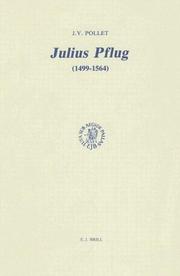
ISBN: 9004092412 900447692X 9789004092419 Year: 1990 Volume: 45 Publisher: Leiden; Boston : BRILL,
Abstract | Keywords | Export | Availability | Bookmark
 Loading...
Loading...Choose an application
- Reference Manager
- EndNote
- RefWorks (Direct export to RefWorks)
This book retraces the life and work of Julius Pflug (1499-1564), humanist, man of the church and diplomat. Born from a family of Saxon knights, Julius Pflug was educated mostly in Italy under such masters as Amaseo and Bonamico - hence his excellent Latin style, which even Erasmus admired. During his ecclesiastical career he was provost of Zeitz, dean of Meissen and bishop of Naumburg-Zeitz. As such he attended the Council of Trient in its second period (1551/52). Pflug has attracted the attention of historians mostly on account of his role in the so-called Colloquies of religion designed to put an end to the religious schisms which divided the Church as well as the Empire: Regensburg (1541 and 1546), Worms (1557), over which he presided. After the Peace of Augsburg (1555), he was only able to save the remnants of Catholicism in his own diocese. The interest of this biography is twofold: firstly, it allows us to survey the progress of the Lutheran Reformation, which Catholic apologists such as Pflug, Gropper, Witzel were unable to stop. Secondly, as Pflug was entangled in all the political and religious events of his time, this book reveals a wide range of personalities in Saxony and Germany, and imperial circles at large. On the other hand, if Pflug's work belongs to a period of transition, it retains through its irenic character an interest of topicality, while opinion is more sensitive to conciliation than to opposition of confessional differences. Following the analysis of the sources due to the publication of Pflug's Correspondence by the same author (published by Brill 1969-1982), this monograph gives a more synthetic view, which addresses itself to a larger public. Ce livre est une biographie de Julius Pflug (1499-1564), humaniste, homme d'Eglise et diplomat. D'une famille de chevalier saxons, Julius recut une formation humaniste auprès des maîtres italiens; son latin est d'une pureté classique qu'admirait même Erasme. Il eut un carrière ecclésiastique: prévot de Zeitz, doyen de Meissen, enfin évêque de Naumburg-Zietz. A ce titre, il assista au Concile de Trente dans sa 2ème période. L'histoire a retenu surtout son rôle dans les Colloques de religion, où il seconda la politique impériale de rapprochement entre Catholiques et Luthériens: Ratisbonne (1541 et 1546), Worms (1557). Depuis la Paix d'Augsbourg (1555), il ne put que tenter de sauver les restes cu catholicisme dans son diocèse. L'intéret de cette biographie est double: c'est d'abord de nous faire assister au progrès de la Réforme luthérienne que les apologistes catholiques, tels que Pflug, Gropper, Witzel, ne parvinrent pas à endiguer; ensuite, comme Pflug a été mêlé à tous les événements politiques et religieux de son temps, nous sommes mis par ce biais en relation avec les personnalités marquantes, tant en Saxe qu'en Allemagne et dans les cercles impériaux. Par ailleurs, si l'oeuvre de Pflug appartient à une période de transition, elle regagne par son irénisme un intérêt d'actualité, alors que l'opinion est plus sensible à la conciliation au'à l'opposition des différences confessionelles. C'est pourquoi à l'analyse des sources fournies par la publication de la Correspondance de Julius Pflug (6 vol.) devait succéder la synthèse sous forme d'étude à la fois biographique et théologique. Celle-ci s'adresse à un public élargi, aussi bien spécialistes de la Réforme que lettrés et étudiants intéressés par l'histoire allemande à l'orée de l'âge moderne.
Reformation --- 929 PFLUG, JULIUS --- 284.1 <43> "15" --- -Protestant Reformation --- Church history --- Counter-Reformation --- Protestantism --- Biografie. Genealogie. Heraldiek--PFLUG, JULIUS --- Lutheraanse hervorming. Reformatie van Luther--Duitsland voor 1945 en na 1989--?"15" --- History --- Pflug, Julius von --- -Biografie. Genealogie. Heraldiek--PFLUG, JULIUS --- 284.1 <43> "15" Lutheraanse hervorming. Reformatie van Luther--Duitsland voor 1945 en na 1989--?"15" --- 929 PFLUG, JULIUS Biografie. Genealogie. Heraldiek--PFLUG, JULIUS --- Pflug, Julius von, --- Von Pflug, Julius, --- Germany --- Julius, --- Pflug, Julius, --- Iulius, --- Pflugius, Iulius, --- Pflug, Iulius, --- Pflugus, Iulius, --- Pflugk, Iulius, --- Pflugus, Julius, --- Pflugk, Julius, --- Pflugius, Julius, --- Pflugk, Julius von, --- Humanism --- Reform (Christianity) --- Theology --- Collections.
Multi
ISBN: 9780521889094 9780521717786 9780511627026 9780511651120 0511651120 0521717787 052188909X 0511627025 9780511593079 0511593074 0511699050 1107201152 0511592140 051159500X Year: 2009 Publisher: Cambridge : Cambridge University Press,
Abstract | Keywords | Export | Availability | Bookmark
 Loading...
Loading...Choose an application
- Reference Manager
- EndNote
- RefWorks (Direct export to RefWorks)
This book studies the connections between the political reform of the Holy Roman Empire and the German lands around 1500 and the sixteenth-century religious reformations, both Protestant and Catholic. It argues that the character of the political changes (dispersed sovereignty, local autonomy) prevented both a general reformation of the Church before 1520 and a national reformation thereafter. The resulting settlement maintained the public peace through politically structured religious communities (confessions), thereby avoiding further religious strife and fixing the confessions into the Empire's constitution. The Germans' emergence into the modern era as a people having two national religions was the reformation's principal legacy to modern Germany.
Christian church history --- History of Germany and Austria --- anno 1600-1699 --- anno 1400-1499 --- anno 1500-1599 --- Reformation --- Réforme (Christianisme) --- Germany --- Allemagne --- Church history. --- History. --- Histoire religieuse --- Histoire --- -284.1 <43> "15" --- Protestant Reformation --- Church history --- Counter-Reformation --- Protestantism --- Lutheraanse hervorming. Reformatie van Luther--Duitsland --"15" --- History --- Réforme (Christianisme) --- 284.1 <43> "15" --- Arts and Humanities
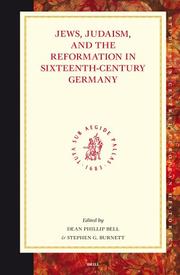
ISBN: 9047408853 1435614771 9781435614772 9004149473 9789004149472 9789047408857 Year: 2006 Publisher: Leiden : Brill,
Abstract | Keywords | Export | Availability | Bookmark
 Loading...
Loading...Choose an application
- Reference Manager
- EndNote
- RefWorks (Direct export to RefWorks)
This book represents a multi-disciplinary approach to the problem of the Jews and the German Reformation. The contributions come from both senior and emerging scholars, from North America, Israel, and Europe, to ensure a breadth in perspective. The essays in this volume are arranged under four broad headings: 1. The Road to the Reformation (late medieval theology and the humanists and the Jews), 2. The Reformers and the Jews (essays on Luther, Melanchthon, Bucer, Zwingli, Calvin, Osiander, the Catholic Reformers, and the Radical Reformers), 3. Representations of Jews and Judaism (the portrayal of Judaism as a religion, images of the Jews in the visual arts, and in sixteenth-century German literature), and 4. Jewish Responses to the Reformation. Contributors include: Dean Phillip Bell, Jay Berkovitz, Robert Bireley, Stephen G. Burnett, Elisheva Carlebach, Achim Detmers, Yaacov Deutsch, Maria Diemling, Michael Driedger, R. Gerald Hobbs, Joy Kammerling, Thomas Kaufmann, Hans-Martin Kirn, Christopher Ocker, Erika Rummel, Petra Schöner, Timothy J. Wengert, and Edith Wenzel.
Judaism --- Christianity and other religions --- Reformation --- Jews --- Religion --- Philosophy & Religion --- Religions --- Semites --- Hebrews --- Israelites --- Jewish people --- Jewry --- Judaic people --- Judaists --- Ethnology --- Religious adherents --- Protestant Reformation --- Church history --- Counter-Reformation --- Protestantism --- Christianity --- Syncretism (Christianity) --- Relations --- History --- 284.1 <43> "15" --- 296 <43> --- Lutheraanse hervorming. Reformatie van Luther--Duitsland --"15" --- Judaïsme. Jodendom--Duitsland voor 1945 en na 1989
Book
ISBN: 9781532617720 1532617720 9781498242622 9781498242615 1498242618 1498242626 Year: 2018 Publisher: Eugene Pickwick Publications
Abstract | Keywords | Export | Availability | Bookmark
 Loading...
Loading...Choose an application
- Reference Manager
- EndNote
- RefWorks (Direct export to RefWorks)
Between 1548 and 1551, controversies over adiaphora, or indifferent matters, erupted in both Germany and England. Matthias Flacius Illyricus in Germany and John Hooper in England both refused to accept, among other things, the same liturgical vestment: the surplice. While Flacius' objections to the imperial liturgical requirements were largely contextual, because the vestments and rites were forced on the church and were part of a recatholicizing agenda, Hooper protested because he was convinced that disputed vestments and rites lacked a biblical basis. The Devil behind the Surplice demonstrates that, while Flacius fought to protect the reformation principle of justification by grace alone through faith alone, Hooper strove to defend the reformation principle that Scripture alone was the source and norm of Christian doctrine and practice. Ultimately, Flacius wanted more Elijahs, prophets to guide a faithful remnant, and Hooper wanted a new Josiah, a young reform king to purify the kingdom and strip it of idolatry.
Adiaphora --- Church vestments --- Reformation --- 284.1 <41> --- 284.1 <43> "15" --- 284.1 "15" --- 284.1 "15" Lutheraanse hervorming. Reformatie van Luther--?"15" --- Lutheraanse hervorming. Reformatie van Luther--?"15" --- 284.1 <43> "15" Lutheraanse hervorming. Reformatie van Luther--Duitsland voor 1945 en na 1989--?"15" --- Lutheraanse hervorming. Reformatie van Luther--Duitsland voor 1945 en na 1989--?"15" --- 284.1 <41> Lutheraanse hervorming. Reformatie van Luther--Verenigd Koninkrijk van Groot-Brittannië en Noord-Ierland --- Lutheraanse hervorming. Reformatie van Luther--Verenigd Koninkrijk van Groot-Brittannië en Noord-Ierland --- English Reformation --- Church costume --- Ecclesiastical garb --- Ecclesiastical vestments --- Vestments --- Clothing and dress --- Costume --- Liturgical objects --- Middle things --- Casuistry --- Rites and ceremonies --- Theology, Doctrinal --- History --- Religious aspects --- Christianity --- Flacius Illyricus, Matthias, --- Hooper, John, --- Hooper, --- Hooper, I. --- Hooper, Ihon, --- Hoper, Ihon, --- Hoper, Jhon, --- Hoper, Johan, --- Hoper, Johann, --- Hoper, John, --- Hopper, Joanne, --- Houper, John, --- Houper, --- Flacius, Matthias, --- Illyricus, Matthias Flacius, --- Vlačić Ilirik, Matija, --- Ilirik, Matija Vlačić, --- Flaccius Illyricus, Matth. --- Waremundus, Johannes, --- England. --- Germany. --- Alemania --- Ashkenaz --- BRD --- Bu̇gd Naĭramdakh German Uls --- Bundesrepublik Deutschland --- Deutsches Reich --- Deutschland --- Doitsu --- Doitsu Renpō Kyōwakoku --- Federal Republic of Germany --- Federalʹna Respublika Nimechchyny --- FRN --- German Uls --- Germania --- Germanii︠a︡ --- Germanyah --- Gjermani --- Grossdeutsches Reich --- Jirmānīya --- KhBNGU --- Kholboony Bu̇gd Naĭramdakh German Uls --- Nimechchyna --- Repoblika Federalin'i Alemana --- República de Alemania --- República Federal de Alemania --- Republika Federal Alemmana --- Vācijā --- Veĭmarskai︠a︡ Respublika --- Weimar Republic --- Weimarer Republik --- Germany (East) --- Angleterre --- Anglii͡ --- Anglija --- Engeland --- Inghilterra --- Inglaterra --- Francowitz, Mathias, --- Flach-Francowitz, Matthias, --- Illyricus Flacius, --- Illyricus, Mathias Flacius, --- Matt. Fla., --- Francowitz, Matthias, --- Flaccius Illyricus, Matthias, --- Flacius Illyricus, Mathias, --- Flacius Jllyricus, Matthias, --- Matthias, --- Flacius, --- M. F., --- M. Fl., --- Vlačić, Matija, --- Vlacich, Matija, --- Vlačis, Matija, --- Francović, Matija, --- Francovich, Mattia, --- Franković, Matthias, --- Franković, Mathias, --- Vlačić Franković, Matija, --- Flacius, Mathias, --- Flaccius, Matthias, --- Flacicus, Mathias, --- Flacicus Illyricus, Mathias, --- Illyricus, Mathias Flacicus, --- Flacio, Mattia, --- Flacius, Matthaeus, --- Illyricus, Matthias, --- Illyricus, Flacius, --- Aesquillius, Publius, --- Illyricus, --- Illiricus, --- Waremundus, Joannes, --- Azarias, Carolus, --- Henetus, Theodorus, --- Theophilus, M., --- Hermannus, Johannes, --- Lauterwar, Christian, --- BuÌgd NaiÌramdakh German Uls --- Deguo --- Doitsu RenpoÌ KyoÌwakoku --- Federalʹna Respublika Nimechchyny --- GeÌrman --- Germaniiï¸ a︡ --- JirmaÌniÌya --- Kholboony BuÌgd NaiÌramdakh German Uls --- RepuÌblica de Alemania --- RepuÌblica Federal de Alemania --- VaÌcijaÌ --- VeiÌmarskaiï¸ a︡ Respublika --- Germany (West) --- Europe --- Gėrman
| Listing 1 - 10 of 22 | << page >> |
Sort by
|

 Search
Search Feedback
Feedback About
About Help
Help News
News